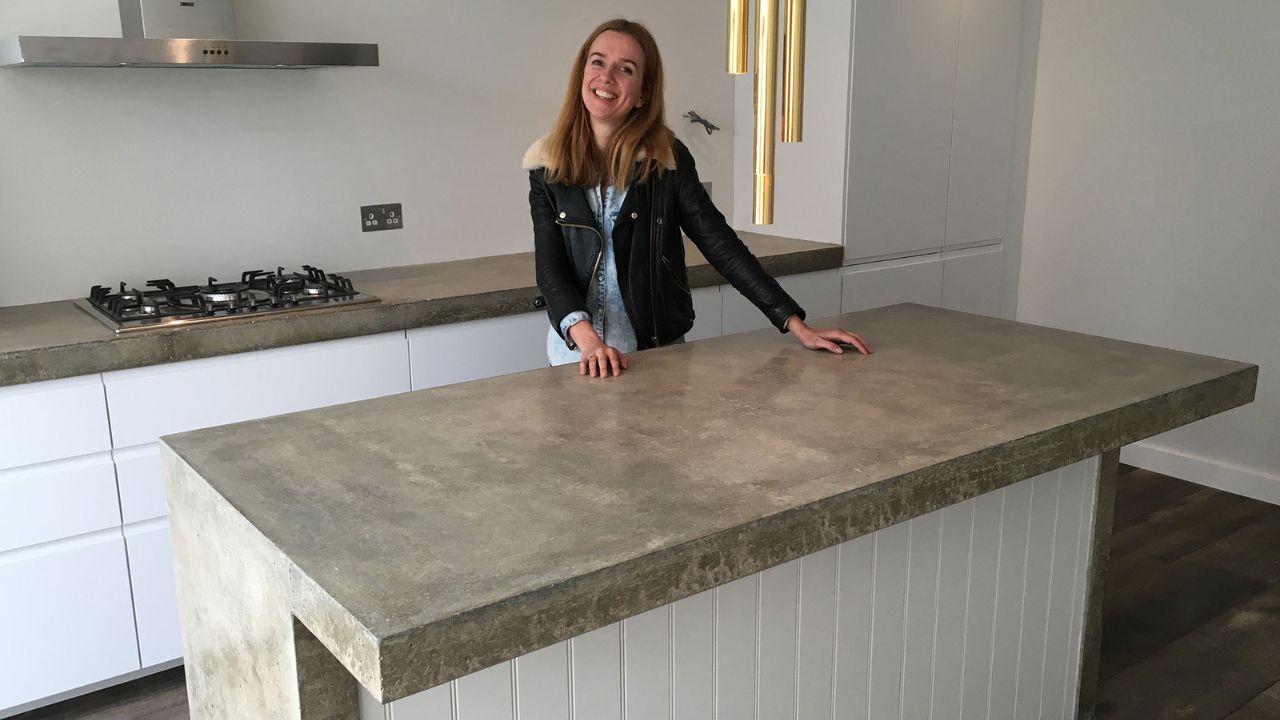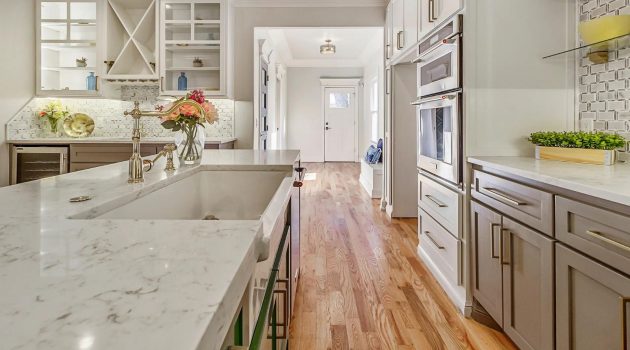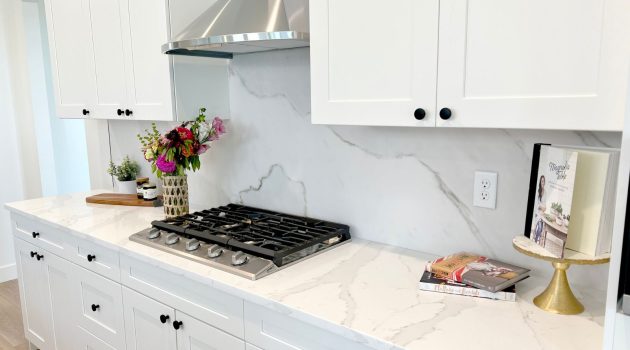When it comes to choosing the perfect countertop for your home, you might be considering concrete countertops as an option.
With their increasing popularity and unique aesthetic, concrete countertops have captured the interest of many homeowners and designers alike.
In this article, we will explore the various pros and cons of concrete countertops so that you can make an informed decision on whether or not they are the right choice for your space.
1. Understanding Concrete Countertops
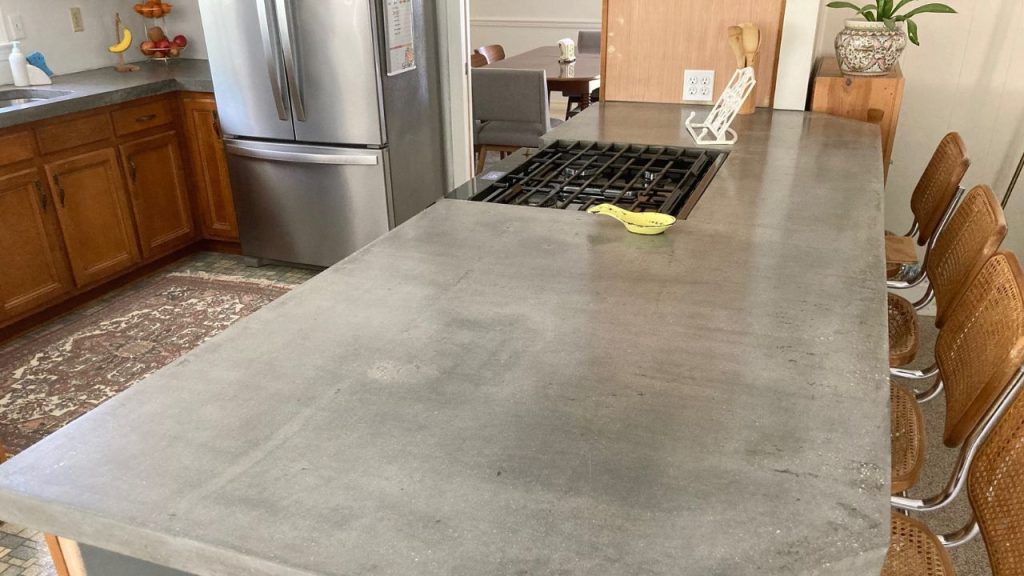
One of the main reasons for choosing concrete countertops is their ability to be customized.
You can shape, size, and mold them to fit your preferences and kitchen layout. This means you get unique, one-of-a-kind countertops tailored to your needs.
Creating concrete countertops involves forming a mold, which is then filled with a specially formulated concrete mix.
Add pigments, stains, or texture to the mix depending on your desired outcome. You can even embed small items like tiles or stones to add a personal touch.
Once the mold is filled, the concrete is tamped or vibrated to release air bubbles, ensuring a smooth and even surface.
The countertop is left to cure, usually for at least 18 hours, before removal from the mold.
Maintaining your concrete countertops is essential to ensure their longevity. Regular sealing is required to prevent staining; general cleaning can be done using mild soap and water.
With proper care, your concrete countertops will look beautiful and last for years.
2. Pros of Concrete Countertops
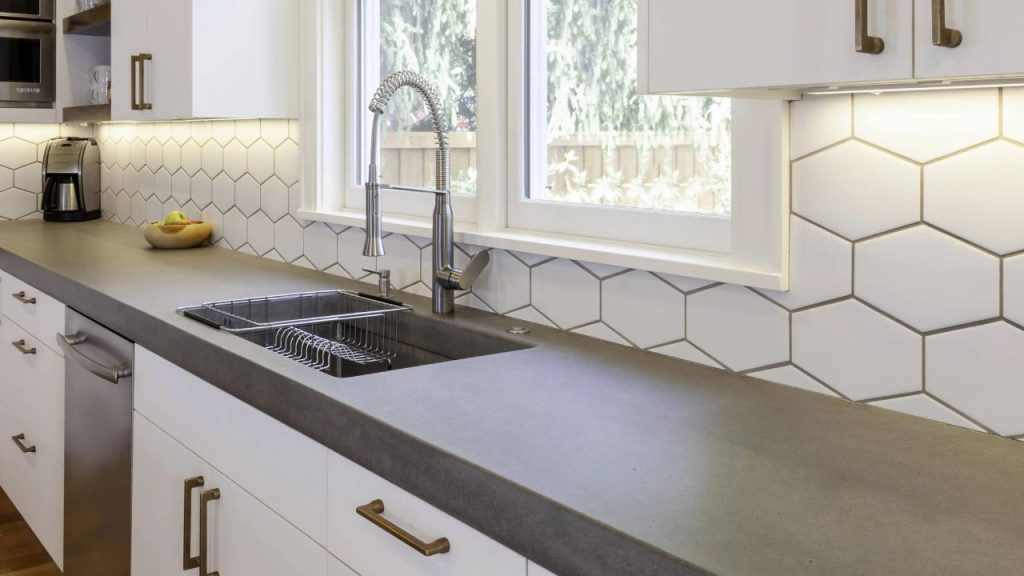
Aesthetic Versatility
One of the major advantages of concrete countertops is their aesthetic versatility. With concrete, you can achieve various colors, textures, and finishes to match your interior design preferences.
You’ll have countless options, from a modern polished look to a rustic matte finish.
Concrete countertops can mimic more expensive materials like marble or granite, allowing you to evoke a sense of luxury without breaking the bank.
In addition to color and finish options, concrete also offers creative design possibilities, including inlays, fiber reinforcement, and precast shapes.
Want to personalize your countertop even more?
Concrete allows for unique embedded items that can be used as conversation starters, like pieces of glass, shells, or stones.
Heat and Durability Factors
Concrete countertops offer excellent durability, thanks in part to their heat and stain-resistant properties.
When properly sealed, these surfaces can withstand high temperatures and resist damage from hot cookware.
Reinforced with fiber or steel, concrete countertops become highly durable, making them a great choice for busy kitchens.
Staying on top of regular maintenance and reapplication of sealer to protect your countertops from stains, etchings, and general wear and tear is essential.
This may be more work than other materials, but the effort pays off in the form of a long-lasting, rock-solid surface.
Customization Possibilities
The true beauty of concrete countertops lies in their endless customization possibilities. You can fully tailor them to suit your space and design preferences.
Working with a skilled artisan will allow you to explore various design options, like veining, patina, and custom edges, to achieve a one-of-a-kind look.
Concrete countertops offer excellent aesthetic versatility, heat and durability factors, and endless customization possibilities.
Proper care and maintenance can make these surfaces a functional and beautiful addition to your home.
3. Cons of Concrete Countertops
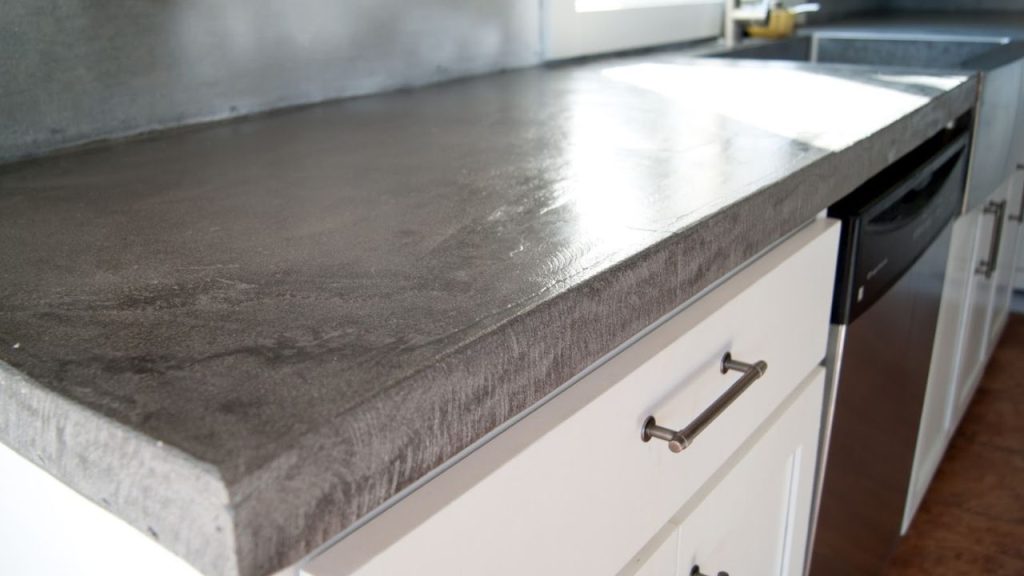
Maintenance Requirements
Concrete countertops require consistent upkeep to maintain their beauty and durability. These countertops must be sealed periodically as a porous material to prevent stains and water damage.
You’ll need to use wax or another appropriate sealer regularly to protect the surface from daily wear and tear.
Keep in mind that proper sealing not only demands your time and attention but can also add to the overall cost of maintaining your countertops.
Potential for Damage
While concrete is known for its durability, it is not immune to damage. Scratches and chips can occur if you frequently cut directly on the surface.
Using a cutting board to protect your countertops from knife marks and other potential damage is always a good idea.
Additionally, concrete countertops can develop hairline cracks over time, which the natural expansion and contraction of the material can cause.
While these hairline cracks may not significantly impact the durability, they can be a visual concern for some homeowners.
In the case of more severe damage, professional repair may be necessary.
Weight and Installation Concerns
Concrete countertops can be heavy, making installation a labor-intensive process.
If you decide on poured-in-place concrete countertops, you must consider potential installation challenges like ensuring proper support structures, preparing the correct wire mesh reinforcement, and managing the site conditions.
These factors will require great planning and collaboration with your contractor.
Since concrete slabs are often large and cumbersome, it’s important to take extra precautions during the installation to avoid any accidents that might result in damage or injury.
Additionally, the weight of concrete countertops may require you to modify or reinforce your existing cabinetry to accommodate the stress on the structure.
By considering these factors, you can make an informed decision on whether concrete countertops are the right choice for your home.
4. Concrete vs. Other Countertop Materials
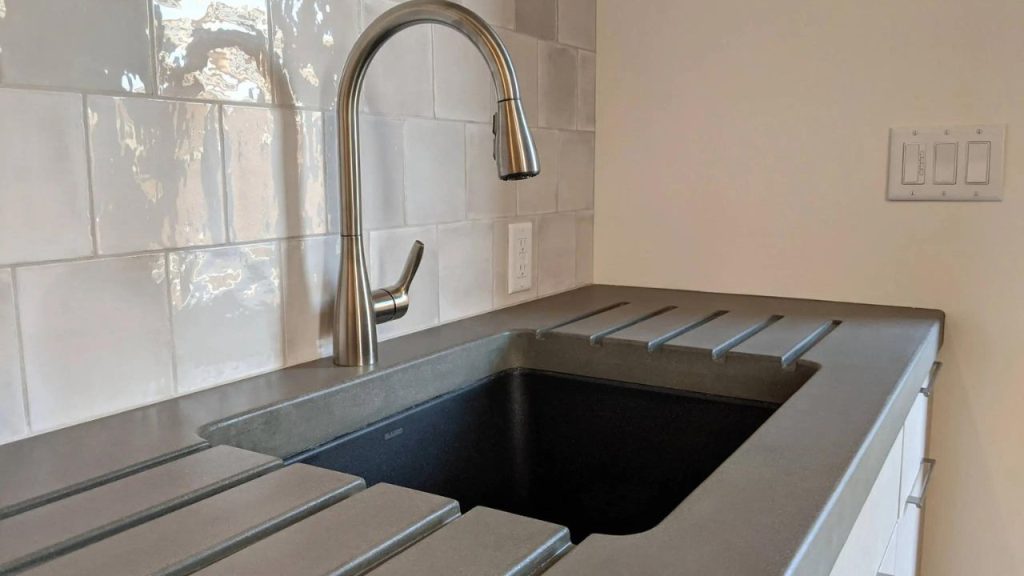
Concrete vs Stone
When comparing concrete countertops to natural stone options such as marble, granite, and slate, some key differences are worth noting.
Concrete offers more customization options regarding shape, color, and embedded objects like shells or glass.
Additionally, concrete countertops can be more cost-effective than some types of stone, especially marble.
However, natural stone is generally considered a more premium material and may have higher resale value. One important aspect to consider is the maintenance.
Both concrete and natural stone countertops require regular sealing to protect their surface from staining and damage.
Concrete vs Wood
Wood countertops bring a warm, natural feel to any space. However, when comparing concrete to wood counter surfaces, there is a marked difference in durability.
Concrete countertops are much more resistant to heat and scratches than wooden surfaces.
Moreover, wood is more susceptible to water damage and bacterial growth, which makes it a less hygienic option for food preparation areas.
While concrete requires sealing to prevent staining and damage, wooden countertops require frequent maintenance, including oiling and sanding, to preserve their appearance.
Concrete vs Quartz
Quartz countertops are made from engineered stone, offering a wider range of colors and patterns than other materials, such as granite.
But even with its variety, concrete still provides more customization options. In terms of pricing, concrete is typically more cost-efficient compared to quartz.
Both materials boast strong durability, with quartz being resistant to scratching and impervious to heat.
Nevertheless, when properly sealed and maintained, concrete countertops will also offer impressive longevity.
In terms of maintenance, quartz does not require sealing like concrete and natural stone, making it a low-maintenance option to consider.
5. Caring for Concrete Countertops
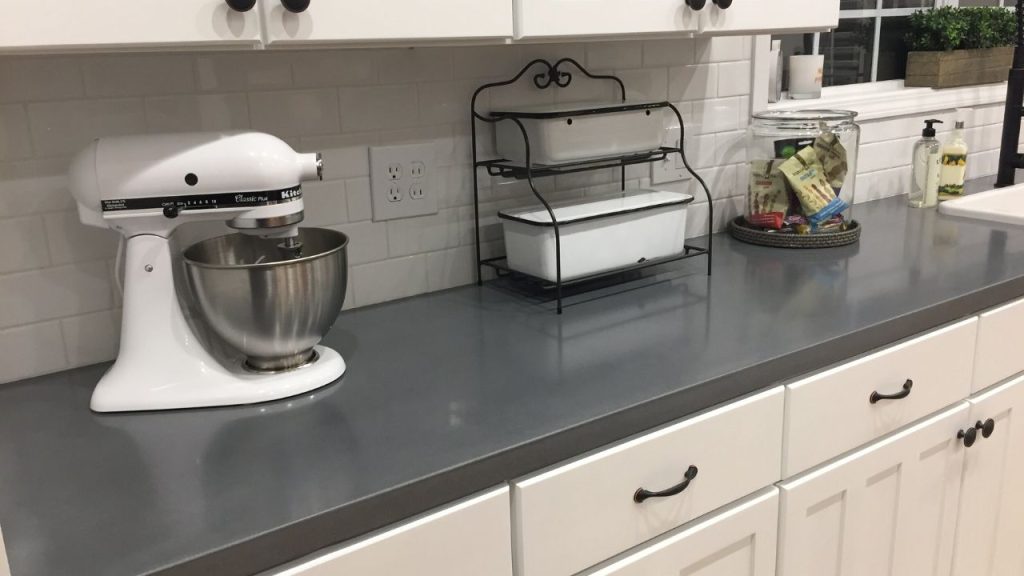
Sealing and Maintenance
Caring for your concrete countertops is essential to maintain their durability and appearance. To start, ensure that your countertops are properly sealed.
Sealing helps to prevent stains and protect the surface from moisture, which can cause damage over time.
To maintain the seal, apply a water-based sealer or a wax every six months to a year.
Between sealings, make sure to clean your countertops regularly. A mild detergent and water are sufficient for daily cleaning to remove dirt and debris.
Avoid harsh chemicals or abrasive cleaners, as they can wear down the sealer and damage the surface. For stubborn stains, you can gently scrub the area using a soft cloth or non-abrasive pad.
Damage Prevention and Repair
Concrete countertops are durable and heat-resistant, but precautions should still be taken to prevent damage.
For instance, always use a cutting board when slicing or chopping food to protect the surface from scratches and gouges.
Similarly, it is a good idea to use trivets or protective pads under hot pots and pans, even though the material is heat-resistant.
This extra care helps to prevent potential thermal shock, which could cause cracking.
If your countertop becomes damaged – such as small chips, cracks, or scratches – don’t worry. Most minor damages can be repaired relatively easily.
Small chips and scratches can often be filled with a suitable filler or color-matched epoxy. In case of more severe damage or stubborn stains, it may be necessary to consult a professional for repair.
By following these guidelines for sealing, maintenance, and damage prevention, you can ensure that your concrete countertops remain in excellent condition for years.
Regular care and attention not only maintain the visual appeal of the surface but also extend the life of your investment.
Frequently Asked Questions
How do concrete countertops handle heat?
Concrete countertops can handle heat quite well, but it’s still advisable to use trivets or heat protectors when placing hot pots and pans directly on the surface. Prolonged exposure to high temperatures can cause the sealant to wear down faster, so taking a few precautions will ensure your countertops last longer.
What’s the durability of concrete countertops?
With proper care and maintenance, concrete countertops can last a lifetime. They are known for their rock-solid durability, and they’re fairly scratch-resistant. By keeping up with routine sealing, waxing, and avoiding harsh chemicals, you can enjoy your countertops for many years.
Do concrete countertops need frequent sealing?
Yes, concrete countertops do require regular sealing to protect them from stains, moisture, and heat damage. Typically, sealing is recommended once a year, but this can vary depending on the type of sealer used and the overall use of your countertops. Don’t worry; the sealing process is relatively simple and can be done by you or a professional.
How much do concrete countertops cost?
The cost of concrete countertops can vary depending on factors such as the installation’s size, design, and complexity. However, on average, you can expect to pay around $65 to $135 per square foot, including installation. While this might be higher than other countertop materials, it’s important to consider the long-lasting nature and unique aesthetics of concrete countertops.
What are the common finish options for concrete countertops?
There are various finish options for concrete countertops, offering you the flexibility to achieve your space’s desired look and feel. Some common finishes include polished, honed, and trowel. Polished finishes result in a smooth, shiny surface, while honed finishes give a matte, more natural appearance. Trowel finishes create a more textured, artisanal surface that adds character to your countertops.
Are concrete countertops prone to cracking?
While concrete countertops are generally durable and long-lasting, they can be prone to hairline cracking. This is usually due to the natural shrinkage of the concrete during the curing process. However, these tiny cracks can be repaired with an epoxy filler or left as a characteristic feature of your countertops. It’s also crucial to follow proper installation practices and maintenance to minimize the risk of cracking.
